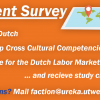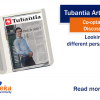Thomas Hazewindus 20-6-2020
Leon van der Neut is an ATLAS student at the UT. In 2018-2019 he represented UReka in the university council. Since late April he is a candidate board member at the national student representative organisation ISO. We had the opportunity to ask him some questions.
Leon, you are a candidate board member of ISO. Could you tell me about that?
Leon: “I first got in touch with ISO through UReka, since I was responsible for the communication between the faction and ISO. It was a very motivating and inspiring time, especially with the language policy discussion at the UT which developed into national debate. In this process I got a sense of what it would be like to be a board member at ISO, now we are here. After two months in training, the board transition is close and then it is time to officially represent almost 750.000 students in the Netherlands. These are truly exciting times.”
How did ISO support you as a UReka faction member?
Leon: “ISO helped me out at lot when we were working on the new language policy at the UT. Especially their expert knowledge on the national discussions supported the case we made as the council. Also, with their experience in these situations and the expertise on student rights of their sister organisation, the student legal aid centre (LSR), we could operate more decisively. The discussion with fellow council members at other institutes connected by ISO helped me to compare the situation at the UT to that at other institutes.”
What can ISO do for UT students?
Leon: “ISO is one level above the university council. With regard to research universities we talk to the ministry and VSNU (umbrella of universities) and we try to put the needs of students on the agenda, just like you do with the executive board. Whatever is decided by the ministry obviously impacts what the executive board of the UT can or must do, alike with other higher education institutes. A concrete example of this are the quality agreements. Together with the LSVB (lsvb.nl), VH(https://www.vereniginghogescholen.nl/) and VSNU (vsnu.nl) we, as ISO, came to an agreement with the ministry regarding the reallocation of student funds after they were discontinued sadly. We agreed that this money had to be spent on a tangible improvement of the quality of education, and student councils had to be involved in making these plans which resulted in the quality agreements. You can imagine that, if we hadn’t been there, this money could have gone anywhere. Obviously, it is important to have students at the table when these decisions are made, but I believe it is not too self-evident that we are. This extends to the stay of international students here in the Netherlands, think of scholarships, visas, and requirements for institutions that attract international students. This will be a main focus of mine in the upcoming year.”
Next week, the students of the UT can vote for the university council. As a very experienced student representative, what would you like to say to the student of the University of Twente?
Leon: “It is very important to allow students to have a say in what is going on at their university, imagine TOM 2.0 or the language policy. Even if you might not be that interested in student participation yourself, make sure that people who want to represent you can. Therefore, you should vote!”
UReka is one of the member associations of ISO. ISO tries to shape public opinion regarding student matter through discussion with politicians, the media, and the ministry. The opinion that ISO represents has to be voted in by our member associations. UReka therefore has a direct influence in the opinion that ISO represents at the ministry and other organisations.
Of all the UT council parties, UReka is the only party that is a member of ISO. The other parties, even though they are welcome at ISO, are not represented at ISO and therefore do not have a say about what ISO does. If a party sends in a point, UReka and the other member associations have to agree with it before ISO can talk with politicians and the ministry about it.





